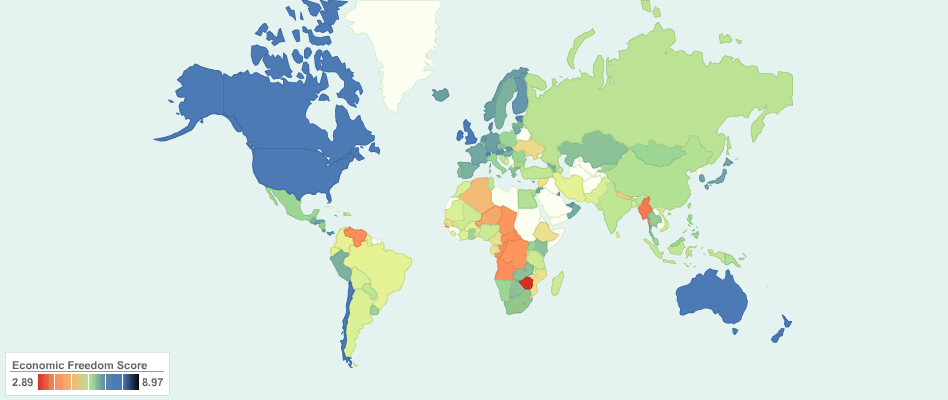This chart shows the Economic Freedom of the World seeks to measure the consistency of the institutions and economic policies of various countries around the world. The ratings are based on a 0 to 10 scale, with 10 being most free and 0 the least.
Average economic freedom score: 6.6
The average economic freedom score rose from 5.55 (out of 10) in 1980 to 6.70 in the most recent year for which data are available. Of the 103 nations with chain-linked scores going back to 1980, 92 saw an improved score and 11 saw a decrease. In this year’s index, Hong Kong retains the highest rating for economic freedom, 8.97 out of 10, followed by Singapore, New Zealand, Switzerland, Chile, the United States, Ireland, Canada, Australia, and the United Kingdom.
What is Economic Freedom of the World?
Economic Freedom of the World measures the degree to which the policies and institutions of countries are supportive of economic freedom. The cornerstones of economic freedom are personal choice, voluntary exchange, freedom to compete, and security of privately owned property. It has been more widely used than any measure of economic freedom. Its use stems in part from the longer time period covered (data exists from 1980-2008), and the fact that this index is constructed from third party information (in contrast to "Index of Economic Freedom" created by the Heritage Foundation).
How is the Economic Freedom of the World calculated?
The first Economic Freedom of the World Report, published in 1996, was the result of a decade of research by a team which included several Nobel Laureates and over 60 other leading scholars in a broad range of fields, from economics to political science, and from law to philosophy. This is the 13th edition of Economic Freedom of the World and this year's publication ranks 141 nations for 2007, the most recent year for which data are available.
The index published in Economic Freedom of the World measures the degree to which the policies and institutions of countries are supportive of economic freedom. The cornerstones of economic freedom are personal choice, voluntary exchange, freedom to compete, and security of privately owned property. 42 data points are used to construct a summary index and to measure the degree of economic freedom in five broad areas:
- Size of Government: Expenditures, Taxes, and Enterprises.
- Legal Structure and Security of Property Rights.
- Access to Sound Money.
- Freedom to Trade Internationally.
- Regulation of Credit, Labor, and Business.
16 years ago

